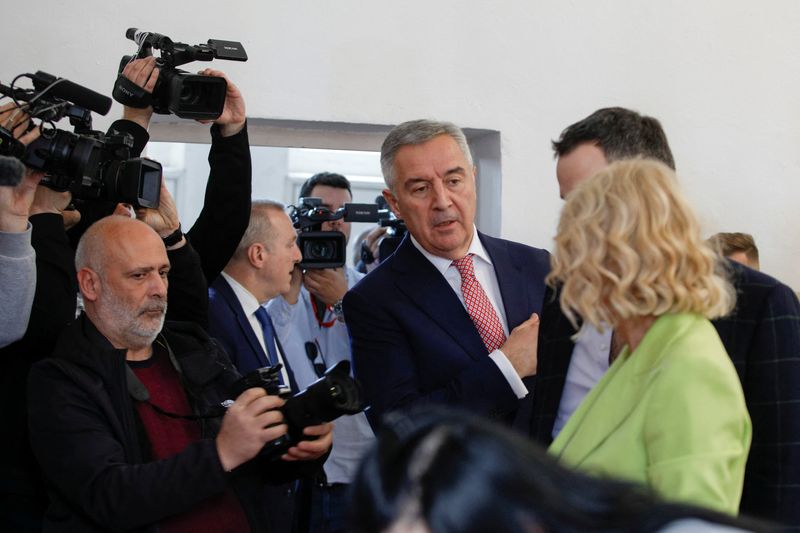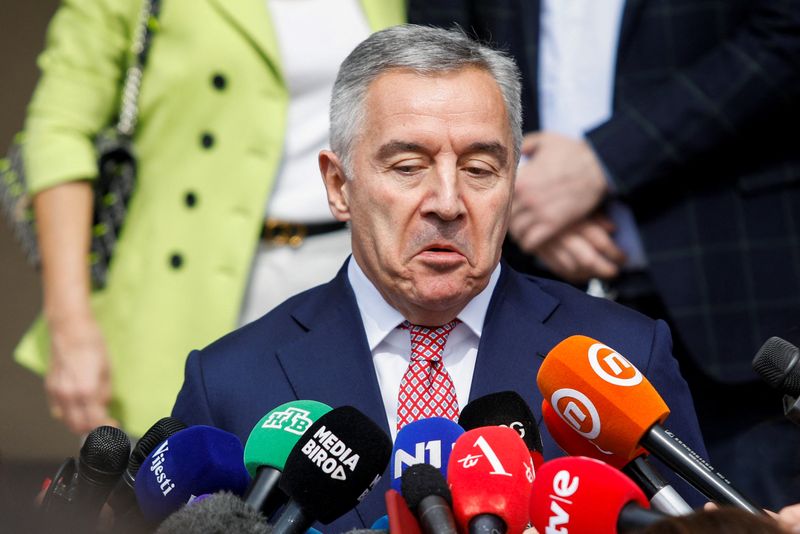By Aleksandar Vasovic
PODGORICA (Reuters) -Montenegro's veteran president, Milo Djukanovic, will face a run-off on April 2 against a pro-Western former economy minister, after no candidate secured a 50% majority in a first- round election on Sunday, according to a projection based on 99.7% of the vote sample.
The Center for Monitoring and Research polling group (CEMI) projected Djukanovic would end up with the most votes, with 35.3%, based on results tabulated from a statistical sample of votes cast.
Former economy minister Jakov Milatovic, a Western-educated, pro-European economist, and the deputy-head of the centrist Europe Now party, was projected to win 29.2%.
Milatovic described his result as a victory of "a beautiful, better, just ... and European Montenegro."
"We have made a decisive step towards April 2 .. and a sealed victory," he said.
Andrija Mandic, a pro-Serb and pro-Russian politician and the head of the Democratic Front (DF) alliance, trailed with 19.3%. He announced support of Milatovic in the run-off.
"Without the support of the DF in the second round there can be no election victory ... I give full support to Milatovic," Mandic told his supporters.
The official result is not likely to be released for several days pending a complaints procedure.
Djukanovic has served as president or prime minister for 33 years. After the vote he told supporters he was satisfied with what he had achieved.
"We are content with this level of support, it is a good foundation ... that will carry us to the victory in the run-off," Djukanovic said.
Opponents accuse Djukanovic and his left-centrist Democratic Party of Socialists (DPS) of corruption, links to organised crime, and of running the country of some 620,000 people as their personal fiefdom - charges Djukanovic and his party deny.
Sunday's vote came amid a year-long political crisis marked by no-confidence votes in two separate governments and a row between lawmakers and Djukanovic over the president's refusal to name a new prime minister.
On Thursday Djukanovic dissolved the parliament and scheduled snap legislative elections for June 11. A victory in the run-off would bolster the chances of his DPS party in the parliamentary vote.
Over the years, Montenegro has been divided between those who identify as Montenegrins and those who see themselves as Serbs and oppose the country's 2006 independence from a former union with neighbouring and much larger Serbia.

The country, which mainly relies on revenue from its Adriatic tourism, joined NATO in 2017, following a botched coup attempt a year earlier that the government blamed on Russian agents and Serbian nationalists. Moscow dismissed such claims as absurd.
Following Russia's invasion of Ukraine last year, Montenegro joined EU sanctions against Moscow. The Kremlin has placed Montenegro on its list of unfriendly states.
